Cohorts
The Cohort
Players can create and control four types of Cohorts:
- Light Infantry – requires weapon only
- Heavy Infantry – requires weapon and armor
- Auxilia – requires weapon only
- Cavalry Auxilia – requires weapon and armor
Enemy units are not constrained to the four types of player cohorts above, and may include
* Siege units
* Barbarian hordes
* Raiders (weaker than other cohorts, with limited behaviors – no siege or scaling of walls)
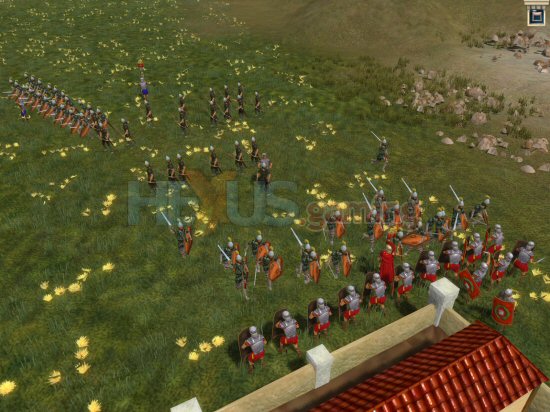 Click for larger image
Click for larger imageCohort UI and Feedback
Every cohort has a “battle standard”.
- It’s a themed, but unique, flag that identifies, distinguishes and provides some info about a cohort. Clicking on the battle standard is the same as clicking on any other figure in the cohort, i.e. it selects the cohort. This standard is created whenever a new cohort is created, and uses coloration and icons to provide distinguishing variations.
- For player cohorts, the standard also displays the cohort’s battle experience.
Regular: simple bronze ball cap
Seasoned: silver eagle cap
Elite: gold eagle with a laurel wreath
- The battle standard is carried by a flag bearer.
The flag bearer is a unit that moves as a part of the cohort but is not considered part of the cohort for any combat purposes, nor counted in the max figures.
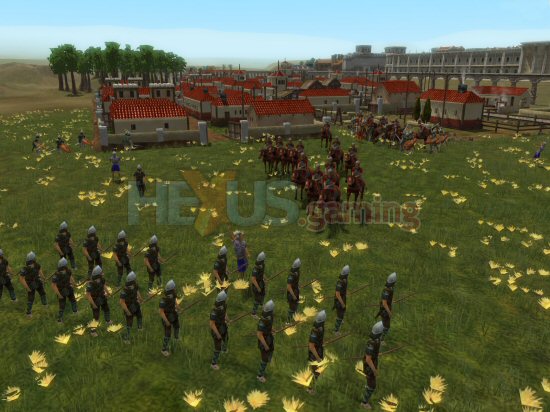 Click for larger image
Click for larger imageMorale
The morale of a cohort is based on a number of factors, and affects both the cohort’s combat effectiveness and its willingness to fight.
* A cohort’s current morale is its base morale minus any penalties accrued from the following:
* Insufficient food: See Cohort Upkeep below.
* Battle Casualties: See Battle Casualties below.
* Time spent in the Fort allows a unit to recover from morale penalties.
* Time spent recovering in the fort and being fed will recover morale.
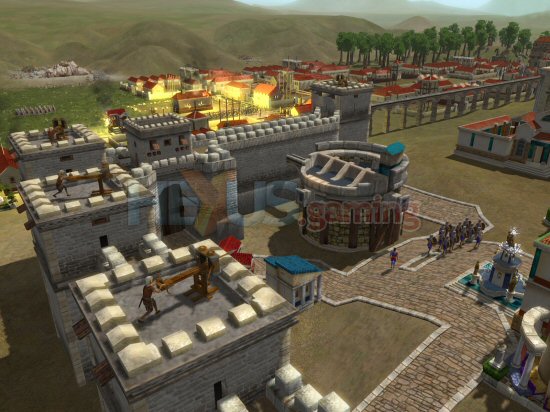 Click for larger image
Click for larger imageCohort Upkeep
Feeding the Army
- Occupied forts send quartermasters to the Mess Hall to obtain food for the cohort.
Quartermasters function as retrievers for the military, but are a separate figure from ordinary pleb retrievers.
Recruiting soldiers
A fort is the destination for soldiers migrating onto the map. Soldiers do not migrate from existing civilian populations on the map. Soldiers are their own social class.
- Note that this is referred to as recruitment rather than migration in game, but is essentially identical to the migration systems. Replacements for loses or desertions follow the same recruitment rules as for new soldiers.
The replacement soldiers require new weapons and armor as appropriate to their cohort type, since lost or deserting soldiers take their equipment.
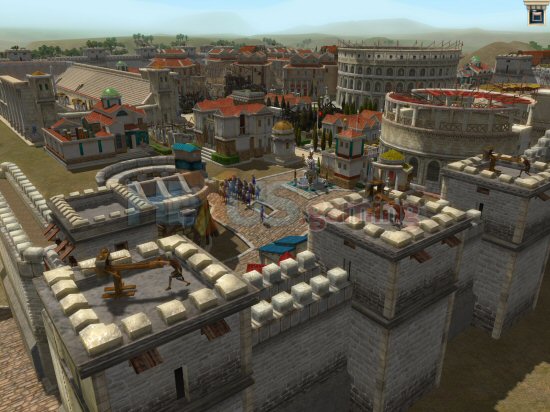 Click for larger image
Click for larger imageCohort Experience
Training at drill yards and fighting in battles can earn experience bonuses for cohorts that improve their combat capabilities. At the end of a visit, a cohort returns ‘home’ to its fort for a time similar to citizen workers at the end of a work day. Training can be interrupted if a player chooses to deploy the cohort on the city level or dispatch it for Empire Level orders/requests.
- Training is kept track of in increments of weeks, but is displayed to the player in months.
- Experienced is earned based on the total amount of time the cohort has spent training.
Cohorts that have spent at least 24 weeks training at a drill yard gain a 25% bonus to hit points (defense) and are described as ‘trained’.
Cohorts that have spent at least 48 weeks training at a drill yard gain a 50% bonus to hit points (defense) which supersedes the 6 month bonus. These cohorts are described as ‘expert’.
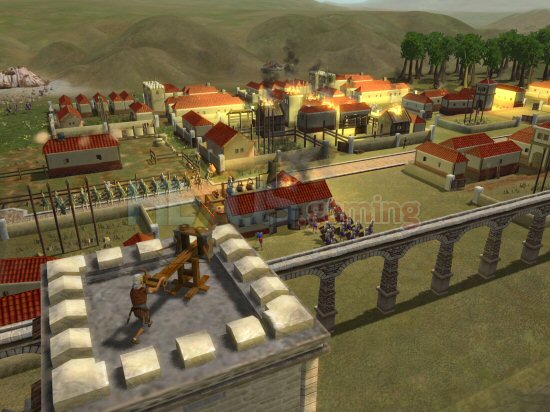 Click for larger image
Click for larger imageFighting in battles
- For each invasion event in which the cohort inflicts damage on an enemy unit, the cohort is considered to have fought one battle.
- Cohorts that have fought 1 or fewer battles are referred to as ‘regular troops’.
- Cohorts that have fought in at least 2 battles are referred to as ‘seasoned troops’.
Successfully returning from being dispatched for an order or request counts as one battle for all surviving cohorts. Units that are both expert and seasoned are considered ‘elite’
- Elite cohorts gain an additional 25% bonus to attack and hit points (defense), and a 25 point bonus to base morale.
All experience bonuses are retained by a unit that suffers losses, so long as the cohort has at least one surviving member. There is no need to re-acquire bonuses when the cohort replenishes its losses.









